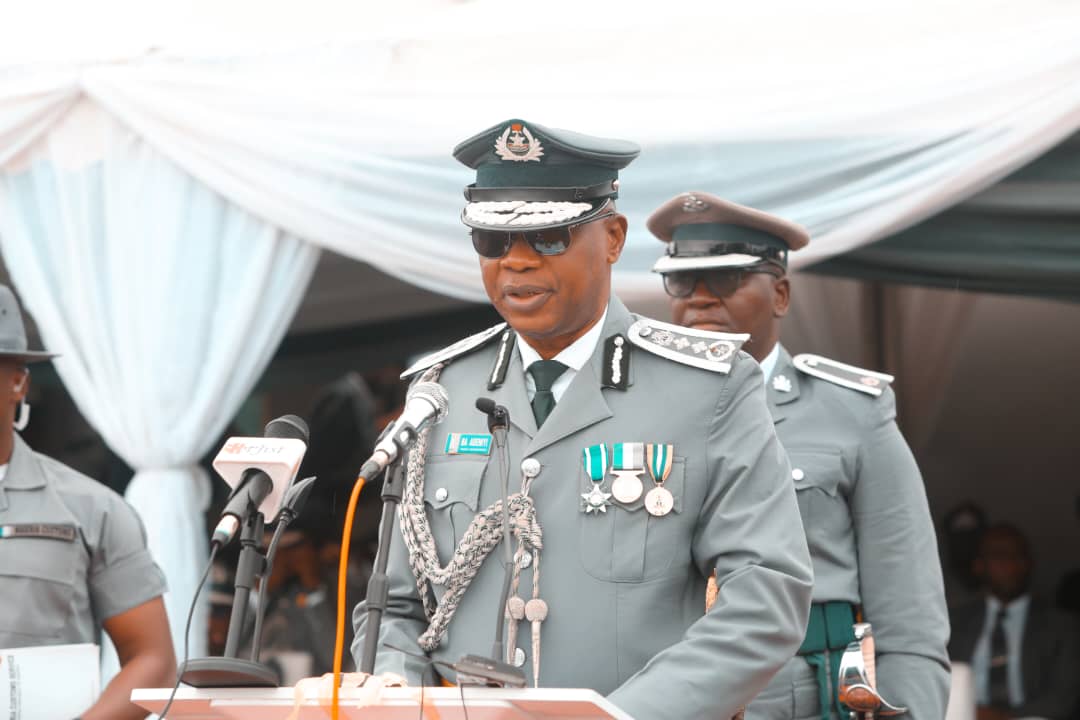Customs
How terminal operators sabotage cargo scanning operations at Tin Can port

—As Customs intends to get mobile scanners to achieve total compliance
The Eyewitness reporter
The Tin can Island command of the Nigeria Customs Service has accused the terminal operators of frustrating the cargo scanning process at the port.
The Area Controller of the Command, Comptroller Olakunle Oloyede, made the veiled accusation last week during his presentation of the command”s performance for 2022.
Comptroller Oloyede alleged that the terminal operators are not willing to provide trucks that will take consignments scheduled for scanning to the scanning site, thus making it difficult for the command to achieve a 100 percent compliance level by importers and their agents.
”It is a big problem for the terminal operators to bring me trucks to take the consignments to the scanning site where the fixed scanners are located”, he lamented, saying ” but customs can”t do it alone, we have to do this work together with other stakeholders, there should be a synergy to get this job done as we all agreed to work together”
”Even, if I have 10 fixed scanners at the port and the terminal operators are not willing to provide trucks to move the consignments to the scanning site, that is a problem”, he stated.
But to circumvent this human obstacle to the scanning operations, Comptroller Oloyeded revealed that the command has decided to procure mobile scanners that will be placed on the quayside to scan containers dropped from the vessels before they are taken to the stacking areas.
”What we intend to do is to buy more mobile scanners and place them at the quayside.
”As your container is dropped on the truck that will take it to the stacking area, it would be made to go through the mobile scanner at the quayside. This will make compliance level compulsory.
”This is because the mobile machines will be at the quayside where they can be moved from one end of the quayside to the other.
”Even, if I have two mobile machines, they are enough for me. We just place them side by side on the vessel and your truck we move through them.
”And the scanning will not be more than five seconds per container. I can scan up to 400 containers a day, even more, without analysis.
”I will just scan for record purposes but when it is time when the owner of the cargo is ready for the clearance process, that is when the risk management tool will tell me which of those containers I have already scanned and kept their records are going for scanning. This is when we scan and analyse.
”This is what we intend to do very very soon”, the Customs chief declared.
On the issue of customs’ failure to apply value depreciation on old cars, Oloyede said that Customs does not have data for cars older than the approved age limit of 2014.
According to him, the system has been configured in such a way as not to recognise them, but rather than outrightly reject them, that is the reason they make them pay the value of the newer cars.
He observed that in other climes, such old cars are meant to be crushed and used as raw materials for other things but lamented that in Nigeria, people still bring in cars of 2005, 2007 into the country.
”There is no data for old vehicles. They are meant to be crushed. Our system is programmed to take cognisance of government policy on the age limit of cars. Any vehicles outside the approved age limit are not recognised..
He extricated Customs from the astronomical increase in the costs of vehicles in the market, attributing the high cost to the galloping exchange rates and the dynamism of the international market.
”When we talk of value for clearance, before, what was the exchange rate, and now, what is the exchange rate? This is what has affected the cost of cars in the market.
”And on value depreciation, you can’t depreciate vehicles that you are not supposed to bring into the country. But for vehicles within the age limit of 2014, the depreciation of value is there”
He also revealed that the system has been configured in such as way that there can’t be human intervention or interference.
Customs
Vicious smugglers lynch young customs officer to death in Katsina , CGC mourns, orders investigation

Customs
Nigeria Customs, Benin Republic Customs collaborate to snuff lives out of Smugglers on Nigeria-Benin border

Highlighting the significance of the collaboration, the CGC underscored, “We are cognizant of the established framework for cooperation between our respective customs administrations.
Welcoming the delegation with open arms, Mrs. Adidjatou Hassan Zanouvi, the Director-General of Benin Customs Administration, reiterated their steadfast commitment to executing the mutually agreed-upon measures, emphasising the importance of thorough monitoring to ensure effective implementation.
The collaborative endeavours between the Nigeria Customs Service and the Benin Republic Customs Administration, according to her, serve as a testament to their shared commitment to facilitating seamless trade operations and ensuring the efficient management of cross-border activities for the mutual benefit of both nations.
In the meantime, during the visit, the CGC seized the opportunity to inspect ongoing projects within the Nigeria Customs Service, Seme Area Command. Accompanied by the Customs Area Controller, Comptroller Timi Bomodi, the CGC meticulously assessed the progress of the projects and received assurances of diligent oversight from the responsible authorities.
Customs
Zone A FOU, PTML, Ogun 1, Western Marine Commands get new Controllers as Oloyede, Peters get promotions in fresh Customs deployment exercise.

Comptrollers Kolade of FOU Zone C, Comptroller Kehinde Ejibunu of FOU Zone A as well as Comptroller Wada have been moved to the Customs Headquarters.
Comptroller Ojo will take over from Comptroller Shuaibu at Ogun 1 Command while Comptroller Oladeji will resume as Controller in charge of FOU Zone A Ikeja.
Comptroller Adegbite will take over at PTML Command while Comptroller Babandede is expected to take over leadership at Onne Port Harcourt 1 Command as the Area Controller.
-

 Headlines2 months ago
Headlines2 months agoHouthis attacks on Red Sea: Maersk hikes freight rate, imposes $1,000 container fee
-

 Customs2 months ago
Customs2 months agoCustoms commences disposal of seized rice at N10,000 per 25kg to needy Nigerians, beneficiaries must have valid NIN
-

 Headlines1 month ago
Headlines1 month agoShippers’ Council in panic mode over implementation of Oronsaye report
-

 Customs2 months ago
Customs2 months agoCustoms mulls establishment of export terminal in Kano for enhancement of trading activities
-

 Customs3 weeks ago
Customs3 weeks agoAmidst decline in cargo throughput, Customs garners N1.347 trillion revenue in three months
-

 Headlines2 months ago
Headlines2 months agoPius Akutah orders mass dismissal of contract staff, casual workers at Shippers’ Council


